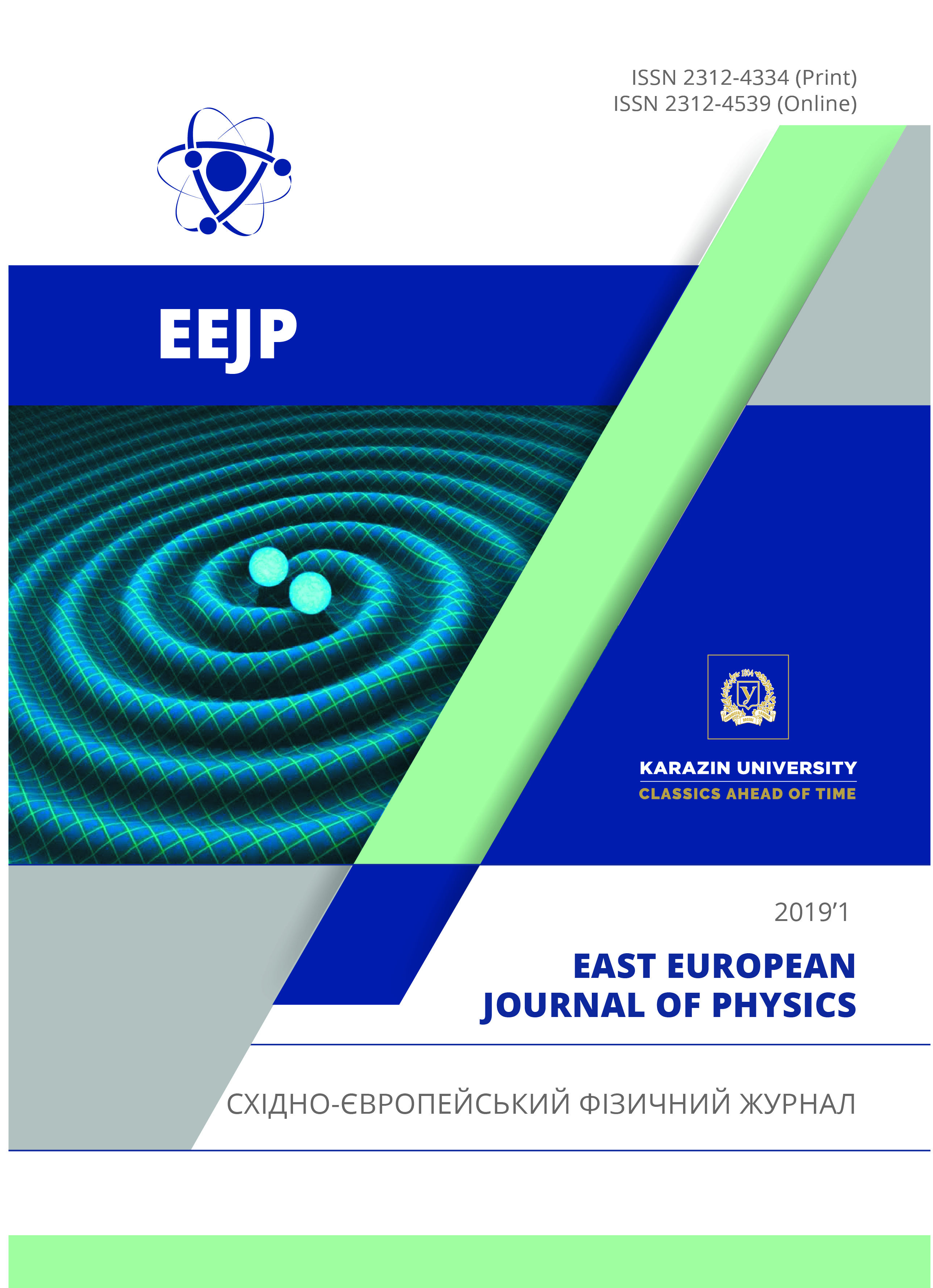Modulation Instability in Two Component Bose-Einstein Condensate with Dissipation
Abstract
In this paper, we consider the dynamic evolution of a binary mixture of a Bose-Einstein condensate taking into account the presence of dissipation inside the components. Using the introduction of the dissipative function, the modified Gross-Pitaevskii equations are obtained. These equations, in contrast to the usual Gross-Pitaevskii equations for two-component condensate, allow us to take into account the dissipation in the system. The influence of dissipative processes on the development of modulation instability in a spatially homogeneous two-component Bose-Einstein condensate is investigated. In contrast to the one-component Bose-Einstein condensate, in which modulation instability arises only when there are forces of attraction between atoms, in a two-component Bose-Einstein condensate nonlinear dynamics, leading to modulation instability is more complex. It essentially depends on the signs and values of the constant interaction of the components, which leads to a greater variety of possible scenarios for the development of modulation instability. The paper considers two cases. The first case is when repulsive forces act inside the components, and the second is when repulsive forces act in the first component, and in the second one - attractive forces. At the same time, the situation when there is a repulsion in the first component, and attraction between the particles in the second component differs significantly from the case of only positive interaction inside the components. The relations between the interaction constants that determine the development of the modulation instability turn out to be different. Given the relations between the interaction constants, taking into account dissipation processes, the occurrence of modulation instability in two-component Bose-Einstein condensates was studied, the maximum growth rate of oscillations was found, and the limits of the existence of modulation instability in the space of wave numbers were found. It is shown that the small effect of dissipation on the modulation instability in the Bose – Einstein condensate is explained not only by the smallness of the friction forces. For wave vectors corresponding to a mode with a maximum increment, the contribution of dissipation in the linear approximation with respect to the dissipative parameter is strictly zero. Thus, the condition for the development of the most rapidly growing mode of oscillations, which determines the beginning of the modulation instability, remains the same as in the nondissipative case.
Downloads
References
S. Burger, K. Bongs, S. Dettmer, W. Ertmer, K. Sengstock, A. Sanpera, V. Shlyapnikov and M. Levenstein, Phys. Rev. Lett. 83, 5198-5201 (1999), https://doi.org/10.1103/PhysRevLett.83.5198.
B. Eiermann, Th. Anker, M. Albiez, M. Taglieber, P. Treutlein, K.-P.Marzlin and K. Oberthaler, Phys. Rev. Lett. 92, 230401 (2004), https://doi.org/10.1103/PhysRevLett.92.230401.
M.R. Matthews, B.P. Anderson, P.S. Haljan, D.S. Hall, C.E. Wieman and E.A. Cornell, Phys. Rev. Lett. 83, 2498-2501 (1999), https://doi.org/10.1103/PhysRevLett.83.2498.
G.P. Agrawal, Phys. Rev. Lett. 59, 880-883 (1987), https://doi.org/10.1103/PhysRevLett.59.880.
E.A. Donley, N.R. Claussen, S.L. Cornish, J.L. Roberts and E.A. Cornell, Nature, 412, 295-299 (2001), https://doi.org/10.1038/35085500.
K.E. Strecker, G.B. Partridge, A.G. Truscott and R.G. Hulet, Nature, 417, 150-153 (2002), https://doi.org/10.1038/nature747.
H.-J. Miesner, D.M. Stamper-Kurn, J. Stenger, S. Inouye, A.P. Chikkatur and W. Ketterle, Phys. Rev. Lett. 82, 2228 2231 (1999), https://doi.org/10.1103/PhysRevLett.82.2228.
T.L. Ho and V.B. Shenoy, Phys. Rev. Lett. 77, 3276-3279 (1996), https://doi.org/10.1103/PhysRevLett.77.3276.
H. Saito and M. Ueda, Phys. Rev. Lett. 86, 1406-1409 (2001), https://doi.org/10.1103/PhysRevLett.86.1406.
E.W. Goldstein and P. Meystre, Phys. Rev. A. 55, 2935 – 2940 (1997), https://doi.org/10.1103/PhysRevA.55.2935.
L.D. Carr and J. Brand, Phys. Rev. Lett. 92, 040401 (2004), https://doi.org/10.1103/PhysRevLett.92.040401.
K. Kasamatsu and M. Tsubota, Phys. Rev. A. 74, 013617 (2006), https://doi.org/10.1103/PhysRevA.74.013617.
S. Ronen, J.L. Bohn, L.E. Halmo and M. Edwards, Phys. Rev. A. 78, 053613 (2008), https://doi.org/10.1103/PhysRevA.78.053613.
Coen S. and M. Haelterman, Phys. Rev. Lett. 87(1-4), 140401 (2001), https://doi.org/10.1103/PhysRevLett.87.140401.
Yu.M. Poluektov, Low Temp. Phys. 40, 389-398 (2014), https://doi.org/10.1063/1.4881395.
C.J. Pethick and H. Smith, Bose-Einstein Condensation in Dilute Gases, 2nd ed. (Cambridge University Press, Cambridge, 2008), p. 569.
P. Ao and S.T. Chui, Phys. Rev. A. 58, 4836-4840 (1998), https://doi.org/10.1103/PhysRevA.58.4836.
Citations
MODULATION INSTABILITY IN TWO COMPONENT BOSE-EINSTEIN CONDENSATE WITH RELATIVE COMPONENT MOTION
Ivashin A.P. & Marinenko E.D. (2019) Problems of Atomic Science and Technology
Crossref
Authors who publish with this journal agree to the following terms:
- Authors retain copyright and grant the journal right of first publication with the work simultaneously licensed under a Creative Commons Attribution License that allows others to share the work with an acknowledgment of the work's authorship and initial publication in this journal.
- Authors are able to enter into separate, additional contractual arrangements for the non-exclusive distribution of the journal's published version of the work (e.g., post it to an institutional repository or publish it in a book), with an acknowledgment of its initial publication in this journal.
- Authors are permitted and encouraged to post their work online (e.g., in institutional repositories or on their website) prior to and during the submission process, as it can lead to productive exchanges, as well as earlier and greater citation of published work (See The Effect of Open Access).








